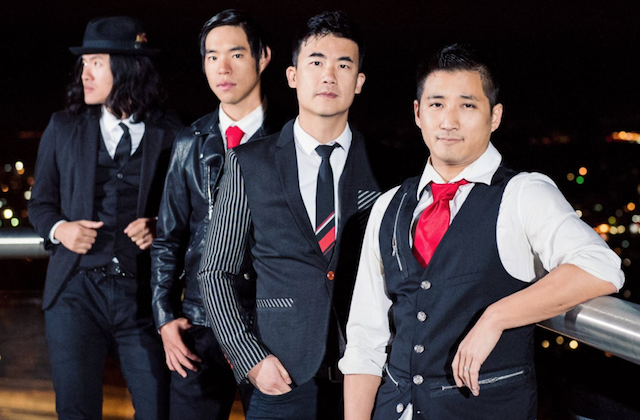Simon Tam believes his all-Asian-American rock band’s name, The Slants, reclaims the anti-Asian slur’s ugly history. That belief has guided his fight to trademark the band’s name all the way to the Supreme Court, which will hear his argument against the U.S. Patent and Trademark Office (PTO) tomorrow (January 18) in Lee V. Tam.
The bassist and band founder told NPR in 2015 that he created The Slants in 2007 and chose the name while brainstorming with a friend. "And I said, ‘Oh, you know, what’s something—what stereotype, what do you think all Asians have in common?’" described Tam. "And they said, ‘Oh, it’s the slanted eyes.’" Tam further explained the name’s meaning to Washingtonian magazine last June. "For us, it has always been about our ‘slant’ on life as people of color," said Tam, who is Chinese- and Taiwanese-American. "Of course, it’s also a way for us to engage in conversations about reappropriation and identity and to pay homage to decades of work by Asian-American activists who used ‘slant’ in a self-empowering way."
USA Today reports that Lee V. Tam grew out of Tam’s failed attempt to trademark the band’s name. His attorneys wrote in a court filing that he first tried in 2011, with the PTO rejecting the proposal because the name deprecates "persons of Asian descent." The Trademark Trial and Appeal Board affirmed this rejection, after which Tam appealed to the Court of Appeals for the Federal Circuit. Rolling Stone adds that the court ruled in Tam’s favor in December 2015, saying the PTO violated Tam’s First Amendment rights when it rejected the trademark.
The Portland-based band wrote on its website that the case will "help marginalized communities fight for identity rights, expand free speech and strike down an outdated law that has been used against communities of color." That law, the Lanham Act, forbids the PTO from rejecting any trademark "unless it…consists of or comprises immoral, deceptive or scandalous matter; or matter which may disparage or falsely suggest a connection with persons, living or dead, institutions, beliefs, or national symbols, or bring them into contempt or disrepute."
The PTO used this "disparagement clause" to reject The Slants’ earlier trademark filings because of its racially-charged name. PTO director and namesake defendant Michelle Lee stood by that rejection in a written response to Tam’s SCOTUS appeal. "Although the First Amendment gives [Tam] broad latitude to use racial slurs in his own communications, it does not require the government to assist him in that endeavor," wrote Lee. Rolling Stone reports that the Court of Appeals’ ruling also struck down the disparagement clause.
Tam’s attorneys argued in the court filing that the band’s name and work confronts anti-Asian racism, and should be understood in that context. "[Tam] intended the band to be a vehicle for expressing his views on discrimination against Asian Americans," they wrote. "In choosing that name, Tam was following in the long tradition of reappropriation, in which members of minority groups have reclaimed terms that were once directed at them as insults and redirected the terms outward as badges of pride."
The letter also notes that the PTO did not invoke the disparagement clause for other registered trademarks with racist slurs. The attorneys cited a trademark for rap group N.W.A. as an example of what The Slants sought to do with their own name. A quick search of common anti-Asian epithets like "chink" and "Oriental" on the PTO’s website confirms this claim.
"We need to allow freedom of expression, especially with those you disagree with the most," Tam told USA Today. "Satire, humor, wit and irony—those are the things that will truly neuter malice." To that end, The Slants’ discography includes albums titled "Slanted Eyes, Slanted Hearts," "The Yellow Album" and "The Band Who Must Not Be Named."
Several groups representing a wide range of political viewpoints, including the non-partisan American Civil Liberties Union (ACLU) and libertarian Cato Institute, filed letters supporting Tam. Another supporter, the Washington NFL Team, tried to attach its own name trademark case to Tam’s in April. The band, which has supported other racial justice causes in its work, rejected this association on its website. "’Redskin’ has a long history of oppression, the football team treats the people as mascots," wrote the band about the team’s Native-slurring name. "On the other hand, Asian-American activists have been using ‘slant’ to present a bold portrayal of our culture for decades now."
Still, the SCOTUS’ decision could set a standard by which the PTO could approve the team’s name and related trademarks. Legal advocacy organizations the Native American Rights Fund and the Fred T. Korematsu Center for Law and Equality cited the Washington NFL Team’s case in letters supporting the PTO’s position.
